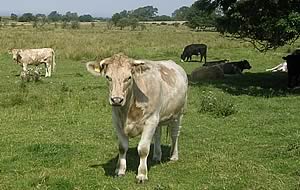 |
|||||||||
|
|||||||||||||||||||
|
|
Call
for Flexibility Over Emergency Slaughter Rules 04/07/06 NFU Scotland is seeking flexibility over rules, administered by the Food Standards Agency (FSA), which govern the slaughter of cattle on farms. The Union believes that new guidelines which came into force this year are overly restrictive and do not support animal welfare efforts on farms.
Until this year, cattle that were unable to be transported could be slaughtered as an emergency on the farm and the carcase moved to the nearest abattoir following veterinary approval. However, under new EU Hygiene Regulations, animals can only be subject to emergency slaughter and entered into the food chain if they have suffered an ‘accident’. Under guidance issued by the FSA, this effectively limits emergency slaughter to cattle that have suffered fractures on farms. This causes significant problems for cattle with more minor ailments, for example a hoof defect. In these cases, an animal may not be able to travel, but now cannot longer be slaughtered on farm to enter the food chain because it has not technically suffered an ‘accident’. The problem is exacerbated by a lack of flexibility for vets to determine the conditions of travel for animals suffering health problems. For example, the requirement for a low loading trailer or single pen travel which could provide better transportation cannot be specified. This closes off many routes for moving animals to abattoirs and makes the need for flexibility in the rules governing emergency, on-farm slaughter all the more important. NFUS believes that the discretion previously given to vets to determine whether an animal that is unfit for travel can be slaughtered as an emergency on-farm should be reinstated. Also, an ability to specify the type of transport for moving cattle off farms would be helpful. Standard inspections at abattoirs would provide further reassurances on the eligibility of animals for the food chain. NFUS Livestock Chairman Nigel Miller said: “For animal welfare reasons many animals have to be slaughtered on farm. Many of these are perfectly fit and safe for human consumption, but this new interpretation on what can be classed as an emergency slaughter prevents them ever going to an abattoir. “Both farmers and vets have contacted NFUS to express their concerns at the welfare impact of the new rules. As an example, one of our members has gone to considerable expense to treat a couple of beef cattle following an accident, however, because they did not recover enough to allow them to travel, they are rendered worthless. They cannot be slaughtered on farm and moved to an abattoir because they are no longer classified as suffering from an accident. The vet can’t even specify a type of travel that would allow them to move. “Making the veterinary treatment of cattle uneconomic like this is totally unhelpful. We have already raised this issue with the Food Standards Agency. All that is required is a return to the same flexibility vets had to make a decision on the farm in the interest of animal welfare.”
|
||||||||||||||||||

|
|
||||||||||||||||||
| home | agri-services | pedigree
pen | news | dairy | beef | machinery property | organisations | site map |
|||||||||||||||||||
